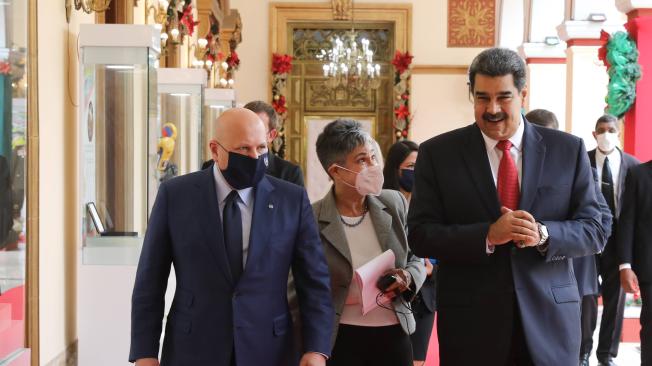Why would the challenge against ICC prosecutor Karim Khan for alleged conflict of interest in the case against Venezuela not succeed?

A few days ago the American newspaper The Washington Post revealed that Venkateswari Alagendra, one of President Nicolás Maduro’s lawyers at the International Criminal Courtis the sister-in-law of the prosecutor of that instance, Karim Khan.
This sparked anger because the ICC is conducting an investigation against Caracas for the case known as Venezuela I, which includes crimes against humanity committed since 2014 in anti-government protests.
In response, the Washington-based Arcadia Foundation announced that filed a formal request for disqualification against Karim Khan with the ICCconsidering that there is a conflict of interest that “compromises the impartiality of the prosecutor and puts the integrity of the judicial process at risk”, with implications for the credibility of the ICC.
But Calixto Ávila, representative in Europe of the Venezuelan NGO Provea, explains that at this time such a recusal is not viable. “At this stage of the procedure there would be no grounds for a recusal (…) if the same situation continues, the possibility could be opened based on rule 34,” says Ávila.
Ávila part that The information must be verified and it must be proven that the link between Karim Khan and the sister-in-law has influenced the investigation.something that does not seem to be the case.
But another aspect that the Provea researcher highlights is that Alagendra would have been part of the team that defended the positions of the Venezuelan State during the appeal before the Appeals Chamber of the International Criminal Court in November 2023 and said chamber did not accept the arguments, giving way to the continuation of the investigation.
This happened – explains Ávila – thanks to the defense that the Prosecutor’s Office made to dismantle the six arguments of the Venezuelan State. “So we are facing a resounding failure of the State and a team in which this person could have been involved. The important thing to highlight is that in similar situations the prosecutor of the International Criminal Court has separated himself from cases such as those in Kenya and Libya and another deputy prosecutor was appointed.”
The Court has a mechanism to resolve these types of situations and, given the prosecutor’s actions so far, we would expect action on the matter in the future.
But for Ávila, another curious factor must also be evaluated, which fits within the logic of the Venezuelan State to discredit the International Criminal Court and the Prosecutor’s Office and which is extended to other international bodies, as happened to Michelle Bachelet when she was High Commissioner for Human Rights of the UN, who was attacked by the Venezuelan State, so this type of information could also obey more to this type of strategies aimed at discrediting international bodies.

Karim Khan with Nicolás Maduro during his visit to Caracas. Photo: EFE/ Miraflores Press
What stage is the ICC investigation into Venezuela at?
The Venezuela I case remains in the investigation phasebeing the first that the court opens in America, which means that at any time, in accordance with the Rome Statute and Article 58, the prosecutor of the International Criminal Court can request the judges of the Preliminary Trial Chamber number one, which is the one that deals with the Venezuela I situation, to issue arrest warrants against those responsible for committing crimes against humanity.
To do so, the prosecutor must show the judges that there are reasonable grounds to believe that a crime within the jurisdiction of the Court, or several crimes within the jurisdiction of the Court, have been committed under the Rome Statute.
Murder, torture, imprisonment, persecution of a group for political reasons and forced disappearance are some of the crimes, but in addition, after the prosecutor presents his arguments, the judges must determine that the detention is intended to ensure that the person appears in person at the trial, that is, that he can be brought before the judges in The Hague.
Ávila explains that the second aspect is that such an arrest warrant should be aimed at ensuring that the person does not obstruct or endanger the investigation and the proceedings of the Court; and thirdly, it should be aimed at preventing the person from continuing to commit the crimes being investigated or related crimes.
Grupo de Diarios América (GDA), to which El Nacional belongs, is a network of leading media outlets founded in 1991, which promotes democratic values, independent press and freedom of expression in Latin America through quality journalism for our audiences.
Independent journalism needs the support of its readers to continue and ensure that uncomfortable news that they don’t want you to read remains within your reach. Today, with your support, we will continue working hard for censorship-free journalism!
